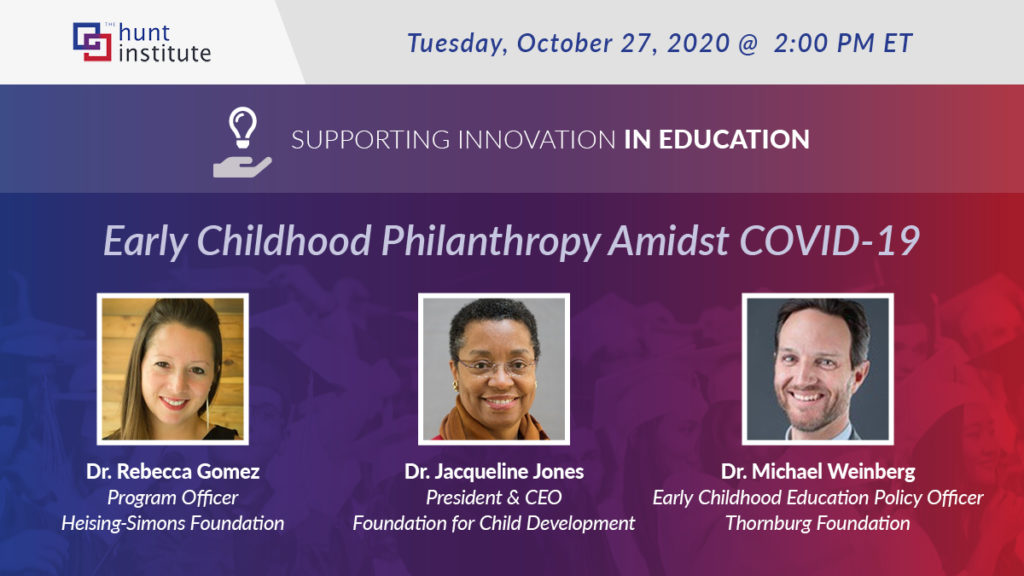Supporting Innovation in Education Webinar Recap: Early Childhood Philanthropy Amidst COVID-19
November 16, 2020

As the nation adapts to the ongoing realities of a global pandemic, the major philanthropies underwriting early childhood investments are likewise adapting their strategies. Dr. Rebecca Gomez, a Program Officer with Heising-Simons Foundation; Dr. Jacqueline Jones, President and CEO of the Foundation for Child Development; and Dr. Michael Weinberg, Early Childhood Education Policy Officer with the Thornburg Foundation, joined The Hunt Institute to share challenges and opportunities they are identifying during this time, and how their giving may be shifting as a result.
A Reckoning on Justice and Racial Inequity
“There are more questions than answers about what the future will look like. Philanthropy still has a lot of work to do. When we think about white supremacy as an overarching structure for the society that we live in and how to dismantle it, philanthropy has a role. We have a lot of learning and growing to do.”
– Dr. Rebecca Gomez, Heising-Simons Foundation
The conversation started with each panelist reflecting on what they may be doing differently while facing COVID-19, the reckoning on justice and racial inequity, as well as a divisive national election season. Each of the panelists shared they have responded by shifting to an adaptive, trust-based philanthropy space, trusting organizations to do what they will to support children, families, and the early childhood workforce. The foundations also tried to support grantees by offering flexibility, asking what is needed, and helping get funding to grantees quickly, or changing grants to grants of general support.
Racial and income inequities remained at the forefront of the conversation throughout the webinar. We learned grantmaking had already shifted to funding groups most affected by inequities. Amplified by the pandemic and the struggle for racial justice, the foundations are working to operationalize a racial and income equity strategy ensuring the work is not tone deaf to the moment.
“Our north star is by 2044, when the country reaches majority people of color. We hope our grant making will have contributed to an elimination of the opportunity gap. That is our overarching goal. We do this is by funding policy, advocacy, grassroots organizing, and efforts to change early childhood systems.”
– Dr. Rebecca Gomez
The Early Childhood Workforce is Essential
The conversation continued noting the recognition that the early childhood workforce as essential. Each of the foundations have a focus on supporting the workforce and were asked about the opportunity to address issues surrounding compensation and professional recognition. While we are seeing more press and media attention surrounding the early childhood workforce, we need to think about doing things differently by working with states facing budget shortfalls and stabilizing the workforce in terms of compensation and preparation.
Dr. Jones shared an infographic from the Center for Study of Child Care Employment which shows the younger the child in the classroom, the less teachers are paid. As the pay decreases, the population of the workforce is more female and more women of color. Acknowledging pay disparities as a social justice issue, we should understand why this is tolerated, and why we expect the workforce to get more educated but without correlated pay. In order to gain that understanding, there is also a need to fund research to inform policy “to lead to better lives for children and the adults who care for them,” building collaborations between those doing research and those creating policy, and supporting a state strategy to connect research to policy and practice. Jones also noted the importance of funding advocacy organizations using the voices of those doing the work.
“We owe it to a workforce that has dedicated themselves to young children to figure out ways in which we can use their voices because while fund research. I believe in the power of research and I also believe in the power of advocacy”
– Dr. Jacqueline Jones, Foundation for Child Development
Weinberg added the importance of funding, governance and development of the early childhood workforce in addressing issues related to increasing access to high quality early childhood programs – home visiting, Pre-K and child care, sharing the strategies New Mexico is implementing. Strategies include consolidating departments to create one early childhood division, creating a Trust Fund to stabilize revenues, and strengthening the workforce by supporting their education.
Supports to Families
The conversation continued asking the panelists about supports the foundations are providing to families in their caregiving role for children. While the foundations do not typically provide direct supports, partnerships and connections with families were highlighted as a need. Philanthropy can do more to lift up the complexity and interconnectedness of the issues related to access and family supports to make a more coherent and comprehensive approach.
Research Gaps and Trends in Teacher Preparation
The panelists then discussed trends and gaps in current research for the field of early education and teacher preparations. Each belong to an Early Educator investment Collaborative which consists of eight early childhood funders focusing on the workforce. The Collaborative released an innovation grant opportunity (now closed) for higher education institutions to foster innovation in transforming early educator preparation programs. This will help in forming research questions around dosage and programs that lead to teacher competencies.
View the full webinar below.


